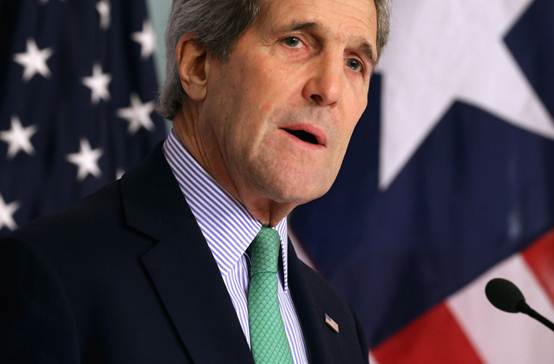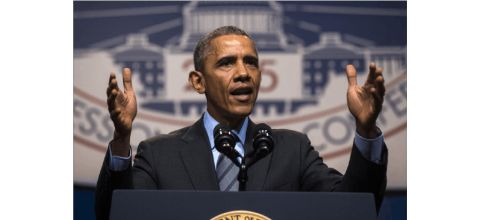时事新闻摘抄:Kerry asks for benefit of the doubt on Iran nuclear talks
Kerry asks for benefit of the doubt on Iran nuclear talks
 WASHINGTON (AP) -- Secretary of State John Kerry on Sunday tried to calm tensions with Israel before Prime Minister Benjamin Netanyahu's congressional address, yet insisted the Obama administration's diplomatic record with Iran entitles the U.S. to "the benefit of the doubt" as negotiators work toward a long-term nuclear deal.
WASHINGTON (AP) -- Secretary of State John Kerry on Sunday tried to calm tensions with Israel before Prime Minister Benjamin Netanyahu's congressional address, yet insisted the Obama administration's diplomatic record with Iran entitles the U.S. to "the benefit of the doubt" as negotiators work toward a long-term nuclear deal.
Kerry said in an interview broadcast before he left for more talks in Switzerland with Iran's foreign minister that Netanyahu was welcome to speak in the U.S. and that the administration did not want the event "turned into some great political football."
That sentiment was a step back from some of the sharp rhetoric between the allies in recent weeks, and Kerry mentioned that he talked to Netanyahu as recently as Saturday.
But Kerry stressed that Israel was safer as a result of the short-term nuclear pact that world powers and Iran reached in late 2013, and he described that improvement as the "standard we will apply to any agreement" with the Islamic Republic.
Officials have described the United States, Europe, Russia and China as considering a compromise that would see Iran's nuclear activities severely curtailed for at least a decade, with the restrictions and U.S. and Western economic penalties eased in the final years of a deal.
"We are going to test whether or not diplomacy can prevent this weapon from being created, so you don't have to turn to additional measures including the possibility of a military confrontation," Kerry told ABC's "This Week."
"Our hope is that diplomacy can work. And I believe, given our success of the interim agreement, we deserve the benefit of the doubt to find out whether or not we can get a similarly good agreement with respect to the future."
Netanyahu, set to arrive in Washington later Sunday, will press his opposition to a diplomatic accommodation of Iran's program in a speech Tuesday to Congress. The prime minister says he is making the address out of concern of Israel's security.
The Republican invitation and Netanyahu's acceptance have caused an uproar that has exposed tensions between Israel and the U.S., its most important ally.
By consenting to speak, Netanyahu angered the White House, which was not consulted with in advance, and Democrats, who were forced to choose between showing support for Israel and backing the president.
"I will do everything in my ability to secure our future," Netanyahu said before flying to Washington. He described himself as "an emissary" of the Jewish people.
The congressional speech also has sparked criticism in Israel, where Netanyahu is seeking re-election on March 17. He also planned to speak Monday at the annual conference of the pro-Israel lobby AIPAC.
Netanyahu considers unacceptable any deal that does not entirely end Iran's nuclear program. But President Barack Obama is willing to leave some nuclear activity intact, backed by safeguards that Iran is not trying to develop a weapon. Iran insists its program is solely for peaceful energy and medical research purposes.
The dispute has become more personal of late.
Last week, Obama's national security adviser, Susan Rice, described the timing and partisan manner of Netanyahu's visit as "destructive" for the U.S.-Israeli relationship.
On Sunday, Kerry painted a more positive picture of continued close cooperation. He said the U.S.-Israeli security partnership was closer than at any point before, and noted the large investment of American money in the Jewish state's Iron Dome missile defense system.
He said the U.S. government has "intervened on Israel's behalf in the last two years a couple of hundred of times" in more than 75 forums "in order to protect Israel."
第二篇:时事新闻摘抄:Iran says GOP letter suggests US is 'not trustworthy'
Iran says GOP letter suggests US is 'not trustworthy'

TEHRAN, Iran (AP) -- Iran's foreign minister said Tuesday a letter from U.S. Republican lawmakers warning that any nuclear deal could be scrapped once President Barack Obama leaves office suggests the United States is "not trustworthy."
"This kind of communication is unprecedented and undiplomatic," Mohammed Javad Zarif was quoted as saying by a state-run TV website. "In fact it implies that the United States is not trustworthy," he added.
Zarif linked the letter to Israeli Prime Minister Benjamin Netanyahu's speech to Congress last week, in which the Israeli leader argued against the emerging agreement. "A propaganda campaign has begun with Netanyahu's speech before Congress and this is their second ploy," Zarif said. "While there is still no agreement, a group is commenting on its nature."
"It is unfortunate that a group is opposed to reaching an agreement. We insist that a possible deal should be one where our people's rights are observed and we are certain that there are measures to achieve such a deal," he said.
The White House and Democrats in Congress also denounced the letter, accusing the senators of trying to sabotage the negotiations.
The United States, along with five world powers, hopes to negotiate a framework
agreement this month and a final accord later this year which would curb Iran's nuclear program in exchange for sanctions relief.
Western nations have long suspected that Iran is covertly pursuing a nuclear weapons capability. Iran denies seeking nuclear weapons, and insists its program is entirely devoted to civilian applications like power generation and cancer treatments.
-
新闻摘抄
近期中国股市连连下跌上证综指31日再次创下三年多来的收盘新低对此中国证监会有关部门负责人表示股市下跌存在恐慌性因素A股股息率与发达…
-
语文新闻摘抄
向泛滥的伪专家亮亮剑薛建国本报评论员这个月初很多人通过媒体报道认识了一位超级骗子他就是原华尔森集团总裁谢根荣他请人用廉价玉片做出了…
-
新闻摘抄短语
1WastingTimeIsNewDivideinDigitalEra5301Inthe19xxsthetermdigitaldivideemerge…
-
展会新闻稿摘抄
20xx中国国际农业机械展览会在郑州国际会展中心隆重举行该展会一年举办两次本次展会为我公司第一次参加的农机展会主要展示产品为农机变…
-
新闻摘录
4新闻材料20xx年春雀巢公司的泰国冷饮开发团队设计出了一款奇特的冰棍这款产品外形颇似香蕉剥开用果冻制成的可食用黄色外皮后里面就出…
-
展会新闻稿摘抄
20xx中国国际农业机械展览会在郑州国际会展中心隆重举行该展会一年举办两次本次展会为我公司第一次参加的农机展会主要展示产品为农机变…
-
新闻摘抄
近期中国股市连连下跌上证综指31日再次创下三年多来的收盘新低对此中国证监会有关部门负责人表示股市下跌存在恐慌性因素A股股息率与发达…
-
新闻摘抄短语
1WastingTimeIsNewDivideinDigitalEra5301Inthe19xxsthetermdigitaldivideemerge…
-
语文新闻摘抄
向泛滥的伪专家亮亮剑薛建国本报评论员这个月初很多人通过媒体报道认识了一位超级骗子他就是原华尔森集团总裁谢根荣他请人用廉价玉片做出了…
-
时事新闻摘抄:Dead prosecutor was drafting arrest warrant for Argentine president
DeadprosecutorwasdraftingarrestwarrantforArgentinepresidentByRYANGORMANThep…
-
短篇新闻稿
短篇新闻稿1今年以来县工商局积极为挂点的安怀镇福平村办实事支持该村灾后重建资金5000多元捐赠价值7000元篮球架一副黎树荣黎显杰…